6 Science-Backed Benefits of Eating Tomatoes
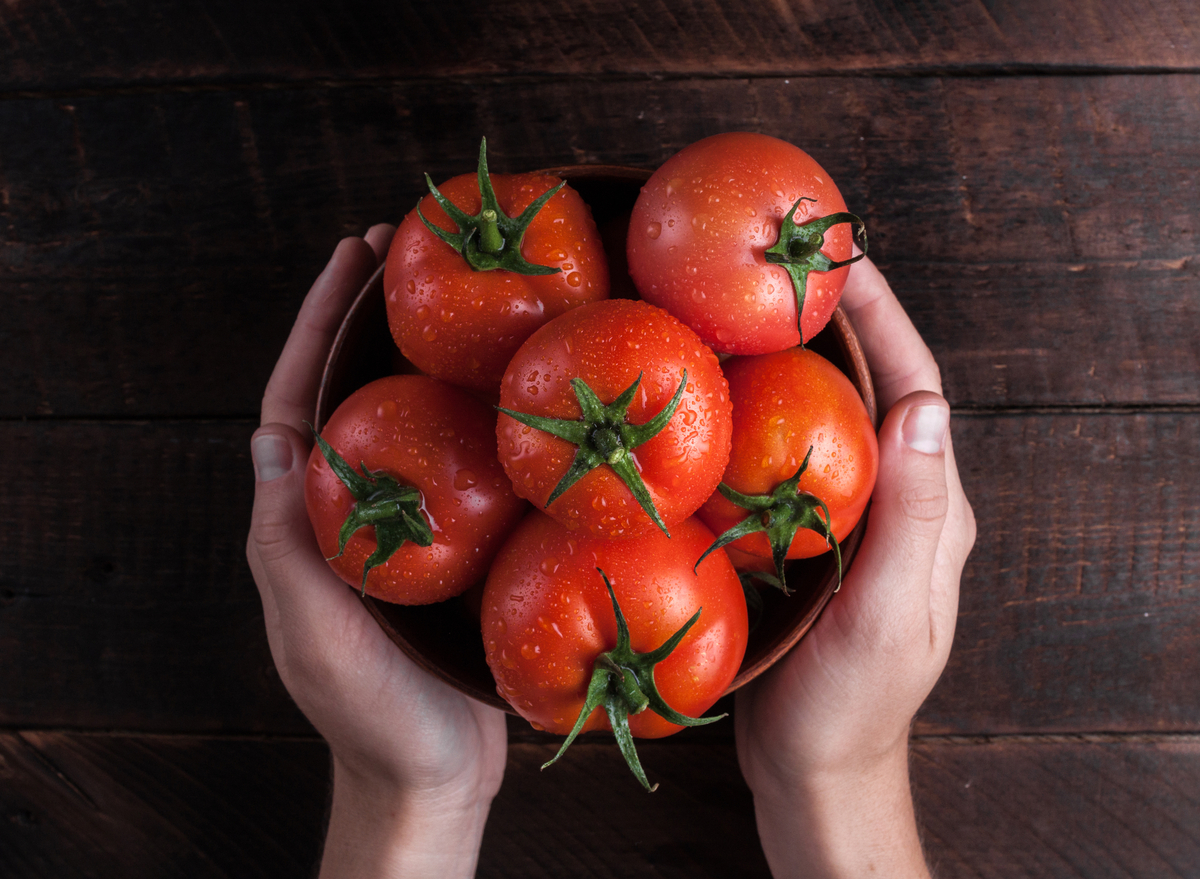
You can't go wrong with fresh tomatoes. Enjoy them as a base for your next pasta sauce, use them to make a glass of fresh juice in the morning, or use the juice for a Bloody Mary-inspired brunch. Not only are they delicious, refreshing, and full of flavor, but the list of tomatoes' benefits—especially those related to your health—is endless.
That said, tomatoes aren't for everyone. They happen to be one of the most common food allergies, and they can also cause some unpleasant digestive symptoms in some people with gastrointestinal issues. However, tomatoes are also antioxidant powerhouses and packed with many other essential vitamins and nutrients.
With that in mind, here are some surprising things that can happen to your body when you eat fresh tomatoes. Read on to learn about some of the benefits of eating tomatoes—and for more insight to help you make the best healthy eating choices for your body, check out Is Canola Oil Bad For You? 9 Side Effects of Using It.
You'll get a boost of antioxidants.
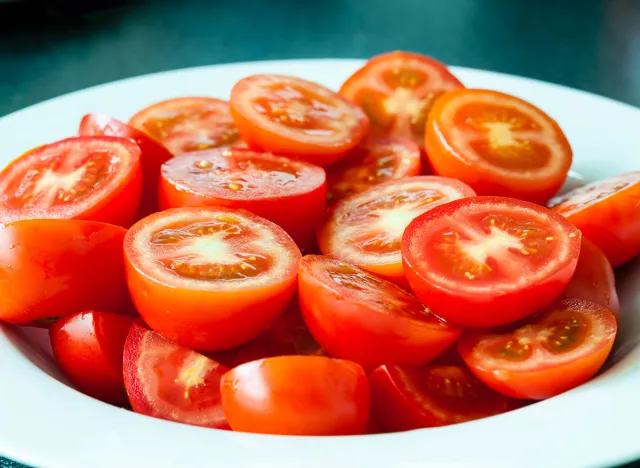
Tomatoes contain an abundance of plant compounds, which are naturally occurring antioxidants found in fruits and vegetables. It's important to get plenty of antioxidants in your diet when you can because these can help fight free radicals in your body, which are molecules that can speed up the aging process and contribute to things like cancer and heart disease.
The antioxidant that tomatoes have the most of is called lycopene, which is responsible for this fruit's bright red coloring. However, you'll want to make sure you're eating the skin of the tomato to get plenty of this antioxidant because that's where the highest concentration is. Also, according to the American Journal of Clinical Nutrition, eating a source of fat alongside your tomatoes will help your body better absorb the lycopene.
You will also consume more potassium.
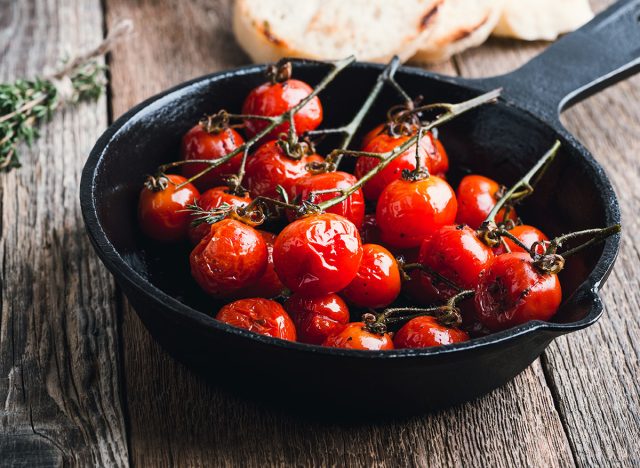
This versatile fruit can help your heart in more ways than one. Not only does it contain antioxidants that can aid in preventing heart disease, but tomatoes are a good source of potassium, which is known to help lower blood pressure. And according to the American Journal of the College of Cardiology, potassium consumption is also connected to a lower risk of stroke, cardiovascular disease, and coronary heart disease. The American Heart Association says that you can enjoy these heart-healthy benefits from tomatoes in any form, from a whole tomato to tomato-based sauces and juices.
You may have a reduced risk of sun-damaged skin.
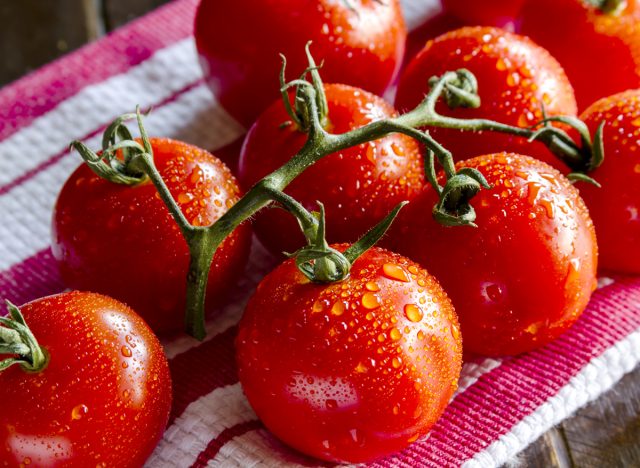
According to Elena Paravantes, RD, founder of the Olive Tomato blog and author of The Mediterranean Diet Cookbook for Beginners, tomatoes are chock-full of carotenoids, a particular type of antioxidant that protects your skin from sun damage. In fact, one 2017 study in Scientific Reports found that regular tomato consumption may prevent you from getting sunburns, thereby reducing your risk of UVB-induced skin tumors.
Your mood may improve.
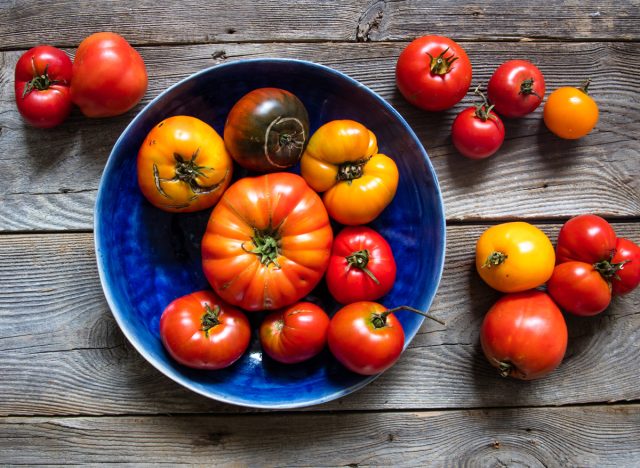
Tomatoes don't just boost the flavor of your meal—they may also boost your mood in the long run, too. A 2013 study in The Journal of Affective Disorders found that elderly participants above the age of 70 who ate tomatoes two to six times a week were 46% less likely to report mild or severe symptoms of depression compared with those who ate tomatoes less than once a week. Notably, other produce used in the study did not produce this same effect.
"Researchers aren't sure which nutrients cause that effect, but they believe it may be the antioxidants—including lycopene," says Paravantes.
Your body may absorb iron more effectively.

Did you know that some foods actually help your body absorb other nutrients better? Tomatoes are one such food, according to Blanca Garcia, RDN, a nutrition specialist for Health Canal. Specifically, they may help you absorb iron, a mineral that plays a key role in making hemoglobin and myoglobin, which are proteins that help carry oxygen to the muscles and organs throughout the body.
Adding to the list of tomato benefits, this fruit can accomplish this because of its vitamin C content. According to the National Center for Biotechnology Information, vitamin C can increase the iron you consume by storing it in a form that your body can more easily absorb. The good news about tomatoes is that a one-cup serving contains nearly 27% of your recommended daily value of this vitamin.
Your wounds may heal faster.

According to Scientific Reports, vitamin C—which tomatoes have plenty of—is needed to help stimulate the synthesis of collagen in the skin. This makes tomatoes a great skin-healthy addition to your diet.
"Vitamin C is needed to make collagen, a protein found in connective tissues that helps with wound healing," says Garcia. "Having a steady intake of vitamin C can help your body heal faster when you cut yourself, are recovering from surgery, or have a pressure wound from being bedridden."
In fact, a 2016 study of hospital patients in the International Journal of Surgery found that when subjects took supplements of vitamin C, they experienced "drastically" faster and better healing of "extensive and complicated" wounds.
Some people may experience indigestion.
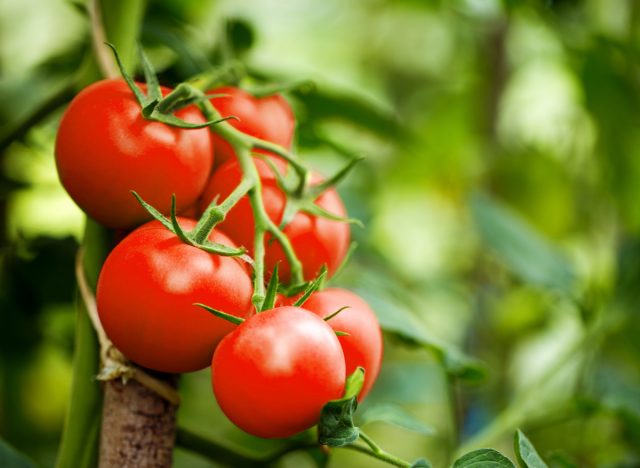
Tomatoes aren't for everyone. If you have acid reflux, for example, this particular fruit can trigger your symptoms, causing a slew of unpleasant symptoms like heartburn, bloating, or indigestion. In fact, patients interviewed for the journal Family Practice stated that both cooked tomatoes and raw tomatoes made their reflex symptoms worse.
"Fresh tomatoes are packed with citric and malic acids, which tend to increase stomach acids," says Nataly Komova, RD, a fitness expert at JustCBD. "Regular intake of fresh tomatoes spikes excessive production of gastric juice, which can worsen acid reflux."
That doesn't necessarily mean you can't eat tomatoes at all if you have acid reflux, but you'll likely need to stick to small quantities and monitor your symptoms.
A previous version of this story was published on June 30, 2022. It has been updated to include additional copy and proofreading revisions, additional research, and updated contextual links.
- Source: https://www.thermofisher.com/diagnostic-education/hcp/us/en/resource-center/allergen-encyclopedia/whole-allergens.html?key=f25#:~:text=Tomatoes%20are%20one%20of%20the%20common%20causes%20of%20food%20allergy,Germany%20(1%2C%208/
- Source: https://www.mayoclinic.org/healthy-lifestyle/nutrition-and-healthy-eating/multimedia/antioxidants/sls-20076428/
- Source: https://www.sciencedirect.com/science/article/pii/S0002916522035286?via%3Dihub/
- Source: https://fdc.nal.usda.gov/fdc-app.html#/food-details/1103276/nutrients/
- Source: https://www.sciencedirect.com/science/article/pii/S0735109710049764?via%3Dihub/
- Source: https://www.heart.org/en/health-topics/high-blood-pressure/changes-you-can-make-to-manage-high-blood-pressure/how-potassium-can-help-control-high-blood-pressure#:~:text=The%20more%20potassium%20you%20eat,80%20who%20are%20otherwise%20healthy./
- Source: https://www.ncbi.nlm.nih.gov/pmc/articles/PMC4931623/
- Source: https://www.ncbi.nlm.nih.gov/pmc/articles/PMC5506060/
- Source: https://pubmed.ncbi.nlm.nih.gov/22840609/
- Source: https://ods.od.nih.gov/factsheets/Iron-Consumer/
- Source: https://www.ncbi.nlm.nih.gov/books/NBK448204/
- Source: https://fdc.nal.usda.gov/fdc-app.html#/food-details/1103276/nutrients/
- Source: https://www.nature.com/articles/s41598-020-72704-1#:~:text=Vitamin%20C%20(Vit%20C)%20benefits,the%20epidermis%20stratum%20corneum%20barrier./
- Source: https://www.sciencedirect.com/science/article/pii/S2405857215300346/
- Source: https://academic.oup.com/fampra/article/27/4/410/532223









